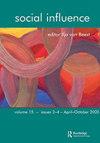Online teaching self-efficacy of Chinese university teachers amidst Covid-19: its changes and the moderation of adaptability and administration quality
IF 0.6
3区 心理学
Q3 PSYCHOLOGY, SOCIAL
引用次数: 0
Abstract
Teacher self-efficacy is among the most valued teacher motivational constructs. However, little is known about university teachers' self-efficacy and even less about changes to it throughout the Covid-19-related online teaching. This study applied a retrospective pre- and post-design to investigate changes in online teaching self-efficacy (OTSE) during Covid-19. Participants included 160 Chinese university teachers, who reported their OTSE before and after the COVID-19 lockdowns, adaptability and administration quality together with demographic information. The self-efficacy for online instruction failed to increase significantly over this period (β=.21, p =.083), whereas that for online technology applications increased significantly (β=.329, p <.01). Individual adaptability and administration quality significantly moderated the changes in OTSE. The implications and limitations of the study are discussed. © 2023 The Author(s). Published by Informa UK Limited, trading as Taylor & Francis Group.新冠肺炎背景下高校教师网络教学自我效能感的变化及其对适应性和管理质量的调节
教师自我效能感是最受重视的教师动机构念之一。然而,人们对大学教师的自我效能感知之甚少,在与新冠肺炎相关的在线教学中,对大学教师自我效能感的变化就更不了解了。本研究采用回顾性前后设计,调查新冠肺炎期间在线教学自我效能感的变化。参与者包括160名中国大学教师,他们报告了新冠肺炎封锁前后的OTSE、适应性和管理质量以及人口统计信息。在线教学的自我效能感在此期间没有显著提高(β=。21, p =.083),而在线技术应用显著增加(β=。329, p < 0.01)。个体适应性和管理质量显著调节了OTSE的变化。讨论了本研究的意义和局限性。©2023作者。由Informa UK Limited出版,以Taylor & Francis Group的名义进行交易。
本文章由计算机程序翻译,如有差异,请以英文原文为准。
求助全文
约1分钟内获得全文
求助全文
来源期刊

Social Influence
PSYCHOLOGY, SOCIAL-
CiteScore
1.50
自引率
0.00%
发文量
4
期刊介绍:
Social Influence is a journal that provides an integrated focus for research into this important, dynamic, and multi-disciplinary field. Topics covered include: conformity, norms, social influence tactics such as norm of reciprocity, authority, scarcity, interpersonal influence, persuasion, power, advertising, mass media effects, political persuasion, propaganda, comparative influence, compliance, minority influence, influence in groups, cultic influence, social movements, social contagions, rumors, resistance to influence, influence across cultures, and the history of influence research.
 求助内容:
求助内容: 应助结果提醒方式:
应助结果提醒方式:


